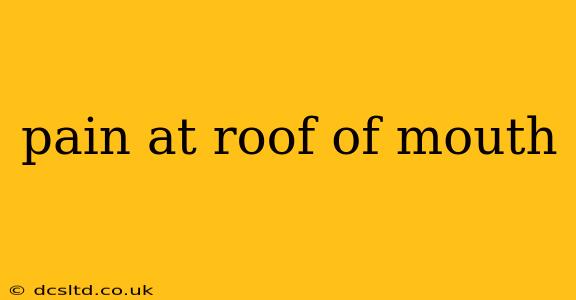Pain at the roof of your mouth, also known as the palate, can be a frustrating and sometimes alarming experience. The causes range from minor irritations to more serious underlying conditions. Understanding the potential sources of this pain is crucial for effective treatment and relief. This comprehensive guide will explore various causes, associated symptoms, and treatment options for pain in the roof of your mouth.
What Causes Pain on the Roof of My Mouth?
The location and nature of the pain can offer clues about its cause. Let's examine some of the most common culprits:
1. Oral Thrush (Candidiasis):
This fungal infection, caused by an overgrowth of Candida yeast, is a frequent cause of palate pain. Symptoms often include white patches or creamy film on the tongue and roof of the mouth, along with burning or soreness. Oral thrush is more common in individuals with weakened immune systems, those wearing dentures, or those taking antibiotics.
2. Canker Sores (Aphthous Ulcers):
These painful, small ulcers can develop anywhere in the mouth, including the palate. While the exact cause remains unclear, stress, hormonal changes, and nutritional deficiencies are suspected contributing factors. Canker sores typically heal within 7-10 days without specific treatment.
3. Injuries:
Accidental biting, burns from hot food or drinks, or irritation from sharp food particles can cause pain and inflammation on the roof of the mouth. These injuries usually heal spontaneously within a few days.
4. Dry Mouth (Xerostomia):
A lack of saliva can lead to dryness and discomfort on the palate. This can be caused by medications, dehydration, or underlying medical conditions. Dry mouth can make the roof of your mouth feel sore and even crack.
5. Allergies:
Certain food allergies or sensitivities can trigger an allergic reaction in the mouth, resulting in pain, swelling, and itching on the palate.
6. Nicotine Stomatitis:
This condition affects the roof of the mouth, particularly in smokers. It appears as red, inflamed patches that may be painful and is a consequence of chronic irritation from smoking.
7. Burning Mouth Syndrome (BMS):
This chronic condition causes a burning sensation in the mouth, often affecting the roof of the mouth, tongue, and lips. The exact cause is unknown, but it may be linked to nerve damage, hormonal imbalances, or nutritional deficiencies.
8. Lupus:
This autoimmune disease can cause inflammation and sores in various parts of the body, including the mouth, sometimes manifesting as pain on the roof of the mouth.
9. Geographic Tongue:
Though usually painless, geographic tongue, a condition causing patches on the tongue, can sometimes extend to the palate and cause a burning sensation.
How Long Does Pain on the Roof of the Mouth Last?
The duration of pain on the roof of the mouth varies considerably depending on the underlying cause. Minor injuries may heal within a few days, while conditions like oral thrush or canker sores may take up to two weeks. Chronic conditions like burning mouth syndrome can persist for months or even years.
What Should I Do If I Have Pain on the Roof of My Mouth?
If the pain is severe, persistent, or accompanied by other symptoms like fever, difficulty swallowing, or bleeding, seek immediate medical attention. For milder cases, good oral hygiene practices, including regular brushing and flossing, can help prevent or alleviate the pain. Over-the-counter pain relievers and mouthwashes can offer temporary relief. However, for persistent or recurring pain, consulting a dentist or doctor is crucial for proper diagnosis and treatment.
When Should I See a Doctor for Roof of Mouth Pain?
You should consult a doctor or dentist if:
- The pain is severe or persistent.
- The pain is accompanied by other symptoms such as fever, difficulty swallowing, or bleeding.
- The pain does not improve after a week of home treatment.
- You notice any unusual lesions or growths on the roof of your mouth.
- You have a weakened immune system.
Remember, this information is for general knowledge and does not constitute medical advice. Always consult with a healthcare professional for diagnosis and treatment of any medical condition.
